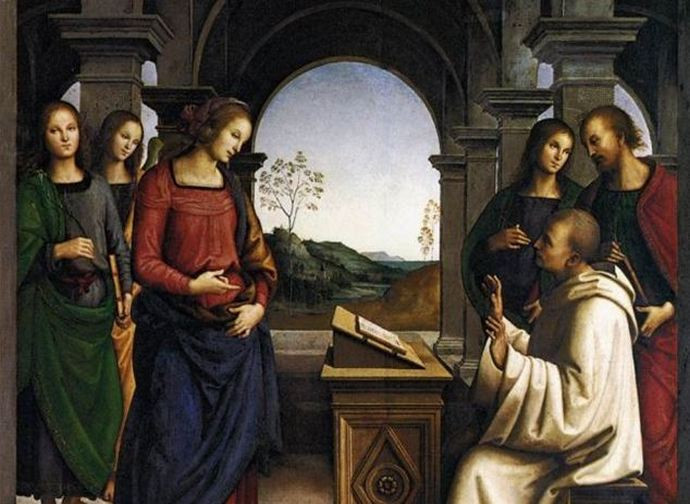Saint Bernard of Clairvaux
In 1112 the Cistercian Order was in serious danger of disappearing. But on Easter morning of that year a charismatic twenty-two year old, later known as Saint Bernard of Clairvaux (c. 1090-1153), with thirty companions, asked to be allowed to wear the Cistercian habit. Their entry was like an overabundance of grace that revitalized the Order

In 1112 the Cistercian Order, founded just 14 years earlier in a marshy area and at the time directed by St Stephen Harding, was in serious danger of disappearing because of the great difficulty in attracting new vocations to the austerity of life typical of Citeaux Abbey. But on Easter morning of that year a charismatic twenty-two year old, who would later become known to the world as Saint Bernard of Clairvaux (c. 1090-1153), came to Citeaux at the head of about thirty companions - including friends, brothers and other family members of noble extraction - asking to be allowed to wear the Cistercian habit. It was Bernard himself, after completing his studies, who had prepared the would-be monks for the previous six months, retiring with them to a house belonging to his father and transmitting to them the beauty of a life consecrated entirely to God. Their entry among the Cistercians was like an overabundance of grace that revitalized the Order, marking a historical turning point.
Just three years after his arrival in Citeaux, where he lived in a perfect spirit of prayer and penance, Bernard was sent by Stephen Harding to the province of Champagne to found a new abbey on a vast clearing received as a donation, rich in water and wood. Twelve companions left with him: they gave the clearing the name Claire Vallée or Clairvaux, and built the monastery with their own hands. Bernard was its first abbot and held that position for 38 years, until his death, when the abbey of Clairvaux - which became the beating heart of a spectacular spiritual renewal - had 700 religious within it and the saint had founded a total of 68 monasteries. In the light of these facts, Alexander III, the pope who canonized him in 1174, could say: “What fruits he has brought to the house of God by his word and his example! It can be said that there is no one, in the whole extent of Christianity, who ignores him”.
Bernard intervened in the most serious questions of his time, which threatened the Church. He travelled across Europe to support the legitimacy of Pope Innocent II, opposed by Pietro Pierleoni (anti-pope Anacletus II), preached in favour of the Second Crusade, fought heresies and in particular the theses of Arnold of Brescia and Peter Abelard. Bernard said of the latter: “When he speaks of the Trinity, his influence is Arius; when of grace, it’s Pelagius; when of the person of Christ, it’s Nestorius”. He composed a great number of letters and works that have had a considerable influence in the history of Christianity to the point of deserving him to be proclaimed Doctor of the Church (under Pius VIII, in 1830) and the title of Doctor Mellifluus. Yet, despite the moral authority and charisma that were recognized to him, he always maintained a profound humility, since he was guided by the desire to work for the greater glory of God and the salvation of souls.
He kept this humility alive by meditating on Mary's sorrows and on the mysteries of Jesus' Passion. The Lord revealed to him the greatest suffering felt in his Body: the holy wound on his shoulder (“three fingers deep, and three bones uncovered...”), which opened under the weight of the cross on the way to Calvary. In one of his most important works, De diligendo Deo, he explained how to reach the heights of God's love, humbly passing through four degrees. The highest of these and the most difficult to achieve (“I do not know if in this life it is possible to reach the fourth degree”, he wrote) is self-love for God: “That is, where man loves himself only for God. [...] Then he will be admirably almost forgetful of himself, almost abandoning himself to concentrate completely on God, so as to be a spirit alone with Him. I believe that this is what the prophet felt when he said: I will enter into the power of the Lord and I will remember only Your justice”.
From his Christocentrism descends his very rich Marian doctrine. Because of his immense trust in her maternal protection, he exhorted people to always pray to Our Lady, as a sure way to God: “In dangers, in anguish, in uncertainties, think of Mary, invoke Mary. Never let her depart from your lips, never from your heart; and so that you may have the help of her prayer, never forget the example of her life. If you follow her, you cannot deviate; if you pray to her, you cannot despair; if you think of her, you cannot err. If she supports you, you will not fall; if she protects you, you have nothing to fear; if she guides you, you will not grow weary; if she favours you, you will reach your goal...”.
Learn more:
Doctor Mellifluus, Pius XII's encyclical on St Bernard
